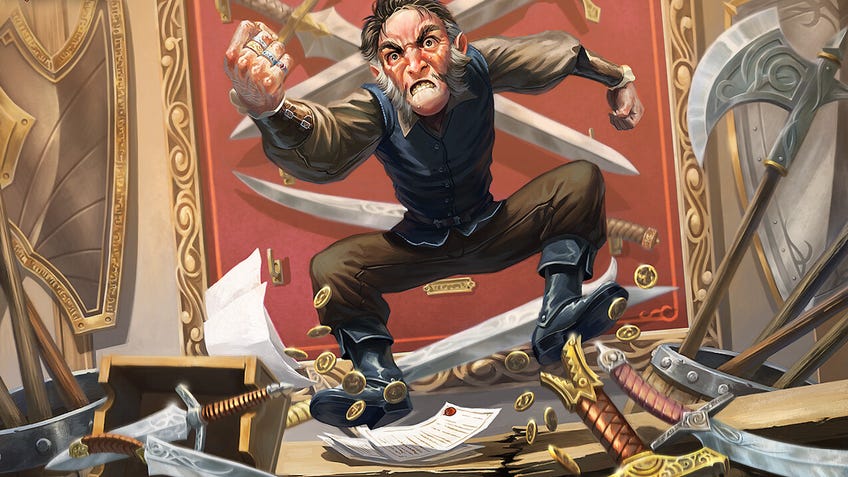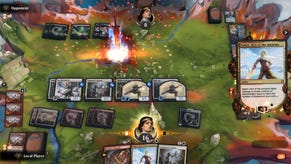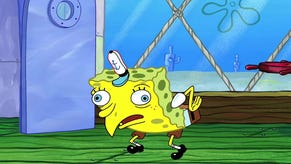Artist lawsuit alleges Midjourney scraped copyrighted Magic: The Gathering art to train AI
New evidence includes a list of artist names, thousands long, full of MTG veterans and fan favourites.
Self-proclaimed “research lab” Midjourney allegedly fed an unknown number of Magic: The Gathering art pieces into its AI-powered image generation tool.
A new piece of evidence added to an ongoing lawsuit against Midjourney, Stability AI and DeviantArt shows thousands of artist names that the plaintiffs assert had their artwork scraped from the internet and fed into Midjourney’s image diffusion tool as training fodder. Called Exhibit J, the list includes dozens, if not hundreds, of artists who have worked with MTG maker Wizards of the Coast in the past. The full list submitted on November 29th composes over 4,700 names.
This could be bad news for Midjourney, as independent artists Sarah Andersen, Kelly McKernan and Karla Ortiz - represented by the Joseph Saveri Law Firm - want to prove that the use of copyrighted images without credit, compensation or consent “violates the rights of artists” and should not continue. Currently shaking out in California’s Northern District courts, the case could create a precedent for “making AI fair & ethical for everyone”, according to the plaintiffs.
Illustrator Reid Southen posted screenshots from what they claim is the Midjourney Discord server, and it allegedly shows CEO David Holz admitting the startup used Magic: The Gathering cards to train their tool. Holz apparently found a list of names on Wikipedia (perhaps even this one) and dumped them into a now-restricted Google Document. “You might find it amusing to hear that early on we would just render out huge swaths of MTG cards as test sequences,” Holz allegedly said on the server.
The current lawsuit’s central thrust argues that the compressed images fed into Stable Diffusion and related generative AI tools are copies of existing works, and the whole process amounts to little more than a “21st-century collage tool”. Midjourney’s “collage” apparently contains the works of storied MTG artists such as Greg Staples, Pete Venters, Kev Walker, Carl Critchlow and Mark Tedin, along with popular illustrators Rebecca Guay, Magali Villeneuve and Winona Nelson.
“These resulting images may or may not outwardly resemble the training images. Nevertheless, they are derived from copies of the training images, and compete with them in the marketplace. At minimum, Stable Diffusion’s ability to flood the market with an essentially unlimited number of infringing images will inflict permanent damage on the market for art and artists,” reads the lawsuit’s website. “[AI] is a parasite that, if allowed to proliferate, will cause irreparable harm to artists, now and in the future.”
Wizards of the Coast is owned by Hasbro, and the publisher of MTG and ultra-popular tabletop RPG Dungeons & Dragons has proven a consistent revenue earner during a tough economic time for toys (and for Hasbro workers - nearly 1,100 were laid off weeks before Christmas last year). It could be highly motivated to protect MTG’s art copyrights, especially seeing as Midjourney’s paid tools reportedly raked in $200 million in 2023. CBInsight estimates the tech startup could be worth as much as $10 billion. Dicebreaker reached out to Wizards of the Coast but did not hear back prior to publication.
Despite a brush with AI-generated art in an official D&D release in mid-2023, Wizards of the Coast has maintained a nominal anti-AI art position in its official products by referring to an internal policy restricting their illustrators from using Midjourny, Stable Diffusion or related tools. Magic: The Gathering’s team went one step further, posting an explicit statement on their official website stating they “require artists, writers, and creatives contributing to the Magic TCG to refrain from using AI generative tools”.
Midjourney did not respond to a request for comment regarding this latest exhibit, which was added alongside an updated plaintiff complaint on November 29th. A judge allowed a direct copyright infringement claim forward, despite the defendants’ attempt to throw it out, but dismissed several of the plaintiff’s attempts to prove that AI art outputs also infringe on existing copyrights. The plaintiffs will have an opportunity to amend the dismissed claims before moving forward.








